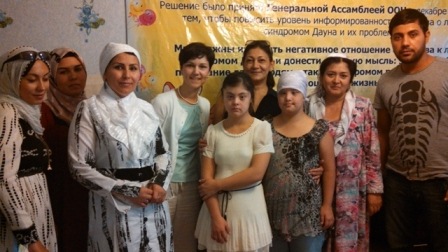WSU Developmental Disabilities Institute (MI UCEDD) Brings Experience and Resources to Tajikistan
October 25, 2013

|
In Tajikistan, where the average person earns $25 a month and spends $17 of it on bread, it's easy for the unique needs of the disabled to be overlooked by a struggling society. But Tajikistan-based advocates for this vulnerable population have found a new ally in Wayne State University's Developmental Disabilities Institute (DDI), which recently sent an advocacy expert to the capital city of Dushanbe to educate and encourage activists as part of an international partnership.
DDI staff member Angela Martin (M.S.W., '00), a specialist in the areas of community and family support and self-advocacy, spent seven days in the former Soviet republic meeting with representatives of IRODA, an organization promoting equal rights for disabled children, and Equal Opportunities, an organization protecting the rights and interests of vulnerable populations. She also gave presentations to clinical and administrative staff at three of Dushanbe's six major child care institutions, which frequently serve as homes for disabled children who, with increased societal support, could enjoy greater independence.
Martin's visit to Dushanbe comprised the first half of a two-way international exchange between IRODA and Equal Opportunities and DDI, which will reciprocate at the end of October by hosting representatives from the Tajikistan organizations in Detroit. The exchange is part of a U.S. Department of State Bureau of Educational and Cultural Affairs-sponsored Professional Fellows EMPOWER Program - administered by Mobility International - that pairs disability rights advocates from around the world with U.S. organizations and experts so they jointly can promote worldwide inclusion, access, and greater awareness of the rights of the disabled.
Tajikistan, which gained independence from the Soviet Union in 1991, is "still in development and carrying forward cultural sentiments" reflecting misinformation about disabled persons, said Martin, adding that the nation's burgeoning movement for greater rights for the disabled has been spearheaded largely by family members. In particular, she said, Tajikistan parents struggle to dispel myths about disabilities, obtain accurate diagnoses for their disabled children, and place their children in appropriate school settings. One of many examples Martin encountered in Dushanbe was an "energetic, eager" young girl who learns at the fifth-grade level, but has been relegated to the second grade because of a behavioral disability.
What can families do? Martin said the first step is to work together.
"It's important for families of the disabled to advocate collectively so they can be seen as a greater movement," she said. "Their movement reflects the nascent movement in the United States in the 1950s and '60s; they don't have to reinvent the wheel, but can use techniques that worked here and even enhance them through technology and new media."
Families should also "recognize their children's personal advocacy and help them develop it," Martin said. "This may not be traditional communication, but a personal expression that can then be voiced by their families."
Martin, who discussed with IRODA and Equal Opportunities the importance of community-based public relations campaigns and public service announcements, said Tajikistan advocacy organizations can similarly benefit from more advanced disabilities movements by translating and disseminating educational materials that have already been developed in other countries. Among the materials to be translated are DDI's "Possibilities" video series (http://ddi.wayne.edu/possibilities.php), which focuses on the lives and accomplishments of individuals with developmental and intellectual disabilities. Each four-to-seven minute video highlights the journeys of different individuals, along with their family and friends, and illustrates the lives possible for all people as they mature, become independent, and pursue their life's dreams and goals.
"The EMPOWER Program exchange is an opportunity to build international collaborations to advance the rights of individuals with disabilities," Martin said. "Our collaboration evolves from the shared interest to develop communities that honor citizens with disabilities, to promote diversity, and to develop systems that deliver person-centered and family-centered supports."







